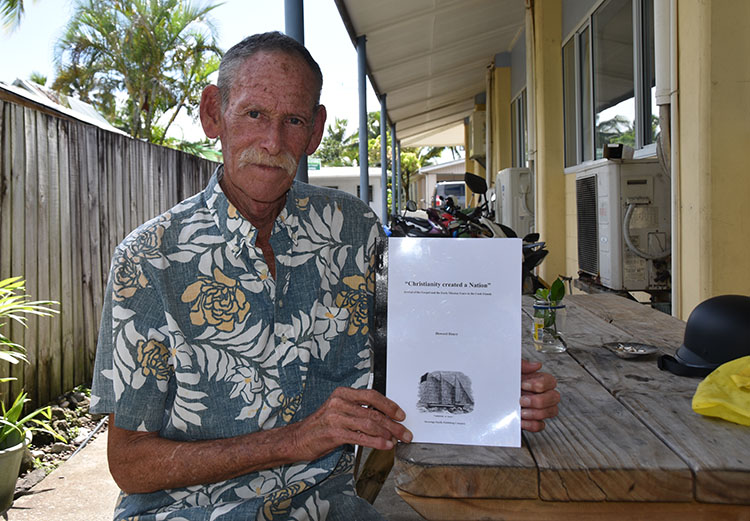Author and historian seeks to trace the arrival of the Gospel
Wednesday 25 October 2023 | Written by Al Williams | Published in Church Talk, Features, Local, National

Author Howard Henry with a copy of his book ‘Christianity created a Nation’. 21082021
Coming of the Gospel is the latest publication from author and historian Howard Henry who has published it through his Sovereign Pacific Publishing Company.
Earlier this year, Henry wrote 15 articles for the Cook Islands News that were published each Saturday from early May through to mid-August.
Each of the articles followed different aspects with regard to the arrival of the Gospel and the Christian faith to many islands of the Cook Islands after first landing at Aitutaki on 26 October 1821.
Henry has since collated those articles and included them into a single publication, along with various illustrations and additional comment.
In addition to those articles published in the Cook Islands News, Henry said he has also included five extra chapters in Coming of the Gospel, regarding the arrival of Christianity to each of those islands now located in the Northern Group.
“Christianity not only brought a new religion to various island communities, but it also brought a whole new style of ‘human Civilisation’ to that in which people had lived during the pre-Christian era.
“Christianity also brought peace to various island communities.
It brought a basic set of regulations in terms of law and order, and how people were to behave during their day-to-day lives,’ Henry said.
Christianity brought prosperity with the later introduction, with a whole raft of material goods that never existed within the island communities during the pre-Christian times, he added.
“Christianity also brought into existence a written language which was basically the dialect of Rarotonga. And it was this dialect of language that was used to create the first Maori Bible.
“So Christianity brought a ‘Cradle to the Grave’ transformation to many people living on various South Sea islands that was very different to the way people had previously lived.
“Christianity brought so many people out of the ‘darkness of the past’ and into the ‘light of the future’.”
Henry said Christianity gave people “new hope, new dreams and a new prosperity”, to which they could aspire to, as they lived a better quality of life and standard of living to what they had before the arrival of the Gospel and Christianity.
“Christianity gave people self-respect. It created village communities where people, of all ages, were able to live, work and support each other every single day of their lives.
“Christianity created a ‘new spirit’ within each Christian community where God was looked upon as the ‘Heavenly Father’. And all those who believed in the Lord were indeed ‘The Children of God’. So Christianity created the ‘basic framework’ in which each island, and each tribe of people, were later able to mould and develop themselves to what they are today.”
Henry said Christianity therefore put in place the ‘foundation stones’, as to how each island, and each tribe of people, were able to evolve and develop their various island communities over the years which followed.
In early June 1901, at a small government function held in Wellington, the government of Great Britain then formally withdrew all the various British annexation proclamations that Lord Ranfurly had previously placed over Rarotonga, and various other islands, on a visit during the early part of October 1900.
This meant that legislation, which had already been passed through the New Zealand parliament, then came into existence for that country to annex both the Northern and Southern groups of islands. So both groups of islands were then united into one single political identity.
And so the Cook Islands then became a colonial territory of New Zealand on 11 June 1901.
“Native teachers” from Takamoa Theological College on Rarotonga had already been in place on these islands for several decades. These teachers had given the residents of each outer island a very strong connection to the London Missionary Society on Rarotonga and to the Takamoa Theological College in particular.
Then there was the dialect of language of Rarotonga, that was introduced by the teachers along with the Rarotonga version of the Bible which had been widely distributed throughout the various outer islands as well.
However, by the time these various islands were annexed to New Zealand on 11 June 1901, they already had a common denomination of religion, a common language by way of the Bible, and religious instruction.
Each island also had a history with several decades of connection, by way of various teachers, directly to both the London Missionary Society as well as to the Takamoa Theological College on Rarotonga.
This facility was established by Reverend Aaron Buzacott and formally opened in 1843.
The work and efforts of all these “native teachers”, and their devoted wives, therefore had a profound influence when it came to establishing and then consolidating the social and political realities in regards to the creation of the Cook Islands.
And they did so several decades before the governments of Great Britain and New Zealand decided what the Cook Islands political landscape would eventually look like.
“Hence, a considered opinion ‘Christianity created a Nation’.
“This nation being the Cook Islands.”
Coming of the Gospel is now on sale to the general public through the Bounty Bookshop in Avarua.














































